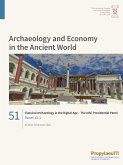Since the very beginnings of the digital humanities, Papyrology has been in the vanguard of the application of information technologies to its own scientific purposes, for both theoretical and practical reasons (the strong awareness towards the problems of human memory and the material ways of preserving it; the need to work with a multifarious and overwhelming amount of different data). After more than thirty years of development, we have now at our disposal the most advanced tools to make papyrological studies more and more effective, and even to create a new conception of "papyrology" and a new model of "edition" of the ancient documents. At this turining point, it is important to build an epistemological framework including all the different expressions of Digital Papyrology, to trace a historical sketch setting the background of the contemporary tools, and to provide a clear overview of the current theoretical and technological trends, so that all the possibilities currently available can be exploited following uniform pathways. The volume represents an innovative attempt to deal with such topics, usually relegated into very quick and general treatments within journal articles or papyrological handbooks.
"This book provides a useful introduction to digital papyrology for scholars interested in digital humanities and papyrologists looking to extend their knowledge of our digital tools. Apart from offering an overview of the state of the art within the field and a start to the epistemology of a new discipline, Reggiani's main contribution to the future of digital papyrology lies in highlighting the fortunate and unfortunate detours of history and the methodological challenges and interesting opportunities ahead."
Joanne Vera Stolk in: Bryn Mawr Classical Review 2018.08.03
Joanne Vera Stolk in: Bryn Mawr Classical Review 2018.08.03








